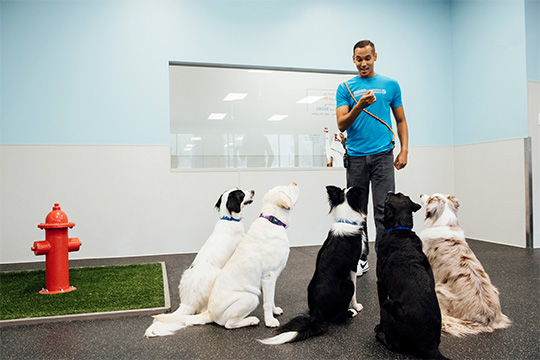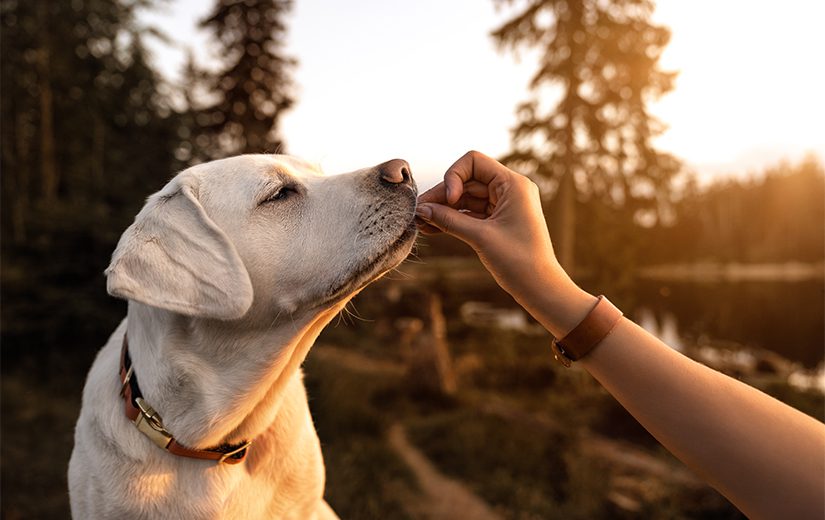Beginner's Overview to Successful Pet Training in your home
Effectively training a canine at home requires a nuanced understanding of canine actions and reliable interaction methods. Establishing clear training goals, making use of high-quality rewards, and maintaining consistency throughout household members are crucial components. Incorporating training into daily regimens can improve both engagement and retention.
Understanding Canine Actions
Comprehending canine behavior is vital for effective training and cultivating a harmonious partnership between human beings and their canine companions - Puppy Training. Pets interact primarily through body movement, vocalizations, and faces, making it crucial for proprietors to translate these signals properly. Acknowledging actions such as tail wagging, roaring, or cowering can supply insights right into a dog's psychological state and purposes
Moreover, recognizing the natural instincts of pets, such as their pack mentality, aids owners develop leadership roles within the family. This is crucial for producing an organized atmosphere where dogs feel safe and secure and are more receptive to training. Dogs are additionally affected by their socialization experiences; very early exposure to various atmospheres, individuals, and various other pets can dramatically form their behavior later in life.
Usual behavior concerns, such as aggression, anxiousness, or too much barking, commonly originate from misunderstandings or unmet requirements. Observing and resolving these problems without delay can prevent acceleration and ensure a positive training experience. By fostering a deep understanding of canine habits, proprietors can customize their training techniques to match their canine friends, inevitably leading to a well-behaved and contented pet.

Necessary Training Devices
A fully equipped training space can significantly improve the effectiveness of dog training in the house. Crucial training devices ensure that both the dog and the fitness instructor can engage in efficient sessions that cultivate understanding and bonding.

Investing in a durable leash and a comfortable, well-fitting collar or harness is essential for safety and security and control. These tools aid develop borders and make certain the pet dog stays safe during training. In addition, a designated training area, devoid of distractions, aids focus for both the trainer and the canine.
Educating help such as training pads, cones, or dexterity equipment can also improve the experience by presenting range and obstacles. Having a note pad or electronic app for tracking development can be invaluable, permitting you to keep in mind successes and locations for improvement. Utilizing these necessary tools will certainly develop a positive training atmosphere and lay the structure for effective discovering.
Producing a Training Routine
Establishing a consistent training regimen is important for reliable pet dog training at home. A well-structured regular not just aids in enhancing preferred behaviors however likewise gives your pet dog with a feeling of safety and predictability. To create a reliable training regular, start by identifying certain training objectives, such as standard commands, chain strolling, or house-breaking.
Select a designated time each day for training sessions, preferably when your dog is receptive and alert. Sessions needs to be brief, approximately 5 to 15 minutes, to keep focus and protect against tiredness. Uniformity in timing and setting will enhance your canine's knowing experience.
Include training right into daily activities to reinforce skills. As an example, method commands during strolls or mealtime, which integrates discovering right into natural routines. Furthermore, stay versatile and readjust the routine as required, accommodating your pet dog's energy degrees and state of mind.
Positive Support Techniques

When implementing positive reinforcement, it is necessary to select benefits that are encouraging for your pet dog. High-value deals with, such as tiny pieces of hen or cheese, can be especially effective during training sessions. In addition, differing the rewards can preserve your dog's passion and enthusiasm.
Begin with simple commands, like "rest" or "remain," and gradually development to extra complex tasks. Uniformity is essential; make certain that all relative use the very same commands and benefit systems to avoid confusion.
Moreover, it is important to stay person and avoid disappointment. Canines, like human beings, learn at their own pace. By cultivating a supportive training environment through positive support, you can boost your dog's knowing experience while enhancing the bond in between you and your furry companion, preparing for successful training results.
Typical Educating Obstacles
While educating a dog at home can be a gratifying experience, it commonly features a collection of usual obstacles that can examine both perseverance and consistency. One widespread problem is distraction. Canines may become easily averted by sounds, activities, or perhaps fragrances in their environment, making it challenging to maintain their emphasis throughout training sessions.
An additional obstacle is inconsistency in commands and support. It can hinder and confuse the pet dog development if household participants use various hints or benefits. Establishing a unified method is vital for effective communication.
Additionally, canines can experience stress or anxiety, especially if they do not understand what is expected of them. This can bring about undesirable habits, such as chewing or barking.
Lastly, the timing of reinforcement is essential. Postponed rewards can diminish the effectiveness of positive support, as pet dogs might stop working to attach the habits with the incentive.
Conquering these difficulties calls for commitment, clear interaction, and an organized training plan - Puppy Training. Identifying and attending to these usual barriers will lead the way for a much more pleasurable and successful training experience at home
Comments on “Dog Training Rochester NY: Tailored Solutions for Every Dog's Needs”